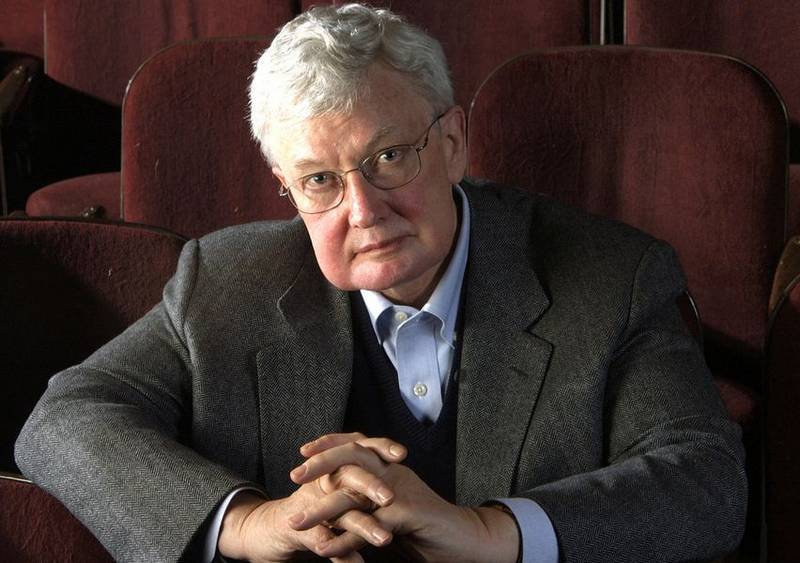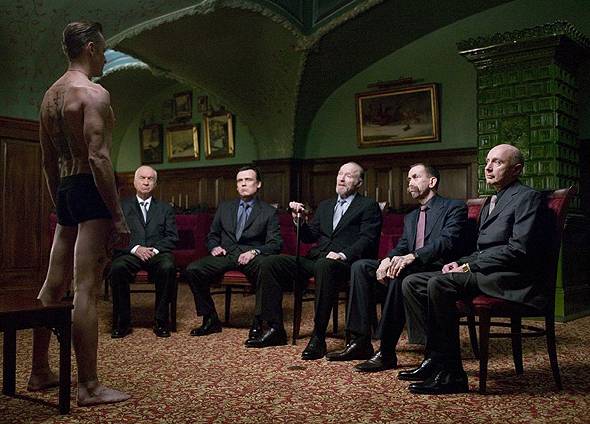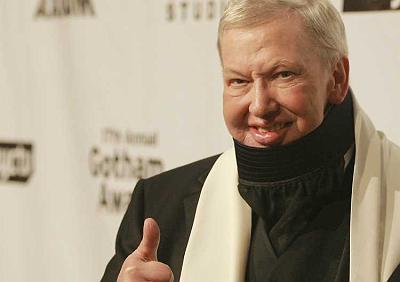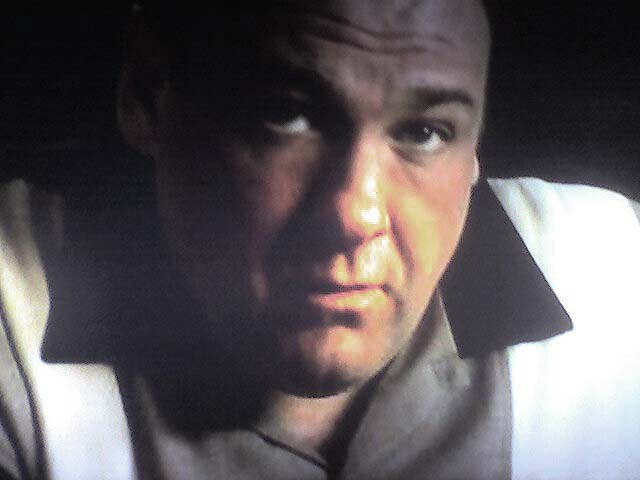Scanners

To the moon, Stanley!
(UPDATED) Stanley Kubrick faked the Apollo 11 moon landing. The Newtown massacre and Boston Marathon bombings were “false flag” government conspiracies designed to take away our guns. Also, black is white, rich is poor, Obama is a foreign-born Muslim, work is freedom, freedom is slavery and Mona Lisa was a man.
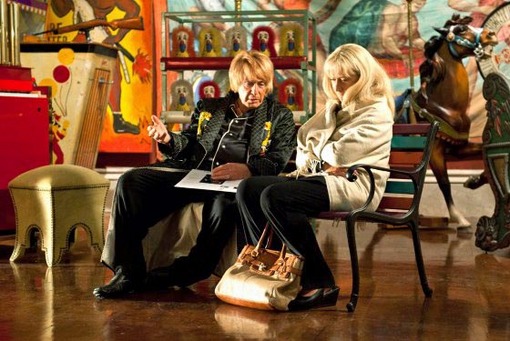
Mamet’s Spector of reasonable doubt
“I believe he’s not guilty.”
“Are you sure?”
“No, but I have a reasonable doubt.”
The last words spoken in David Mamet’s HBO feature film “Phil Spector” are “reasonable doubt.” The first words appear in white letters on a black screen:
This is a work of fiction. It’s not “based on a true story.” … It is a drama inspired by actual persons on a trial, but it is neither an attempt to depict the actual persons, nor to comment upon the trial or its outcome.
I’m not quite sure what that means (beyond “Don’t sue us”) — but it sounds a little like one of Mamet’s nonsensical latter-day post-right-wing conversion rants. (Read Mamet’s 2008 Village Voice essay, “Why I Am No Longer a ‘Brain-Dead Liberal'” and see if you can figure out how he went from an unthinking, ignorant knee-jerk lefty to an unthinking, ignorant knee-jerk conservative. It has something to do with NPR, but what was he listening to? “Car Talk”? He doesn’t say — only that he believes in choosing one’s political positions and convictions the way you would choose a sports team to root for, based on your affection for a place and whatever colors you feel are the most flattering this season.)

Moi, misérable: Fermer le trou à tarte
Another brawl in the square
Another stink in the air!
Was there a witness to this?
Well, let him speak to Javert!
— Javert, a character in the musical “Les Misérables”
I was an eyewitness to “Les Misérables.”
After repeated exposure to that dreadful theatrical trailer-cum-featurette about how the singing is all done live on camera! — It’s live! It’s Live! IT’S LIVE! — I had no intention of seeing Tom “The King’s Speech” Hooper’s film version of the 1980s stage musical. But when it finally came out, some of the reviews were so bad that part of me wanted to see what the stink was all about. Still, I’m not a masochist; I don’t enjoy going to movies I know I’m probably predisposed to dislike just so I can dump on them. On the other hand, there’s nothing better than having your low expectations upended. I did enjoy that Susan Boyle YouTube video back in 2009, but that was all I knew about the musical. I remained curious but skeptical. And then …

Holy Oscar! A long day’s journey into Muriel
But what really matters is the Muriels. You know, that time-honored annual movie award that is not named after Bette Davis’s Uncle Oscar, but after co-founder Paul Clark’s guinea pig. Throughout the month of February (the 6th through the 23rd), the winners have been announced, as you know because you’ve been regularly clicking on the Muriels link right here on Scanners. Anyway, you know what “Argo” can do; the Muriel voters, on the other hand, chose to give the year’s top prize to what, for me, was obviously the most rewarding movie experience of the year: Leos Carax’s “Holy Motors.”
Outguess Ebert on the Oscars
View image (Sun-Times illustration)
Roger Ebert is pretty darned good when it comes to predicting the Oscar winners. (I, on the other hand, have never, ever won an Oscar pool. I’m terrible at it.) This year, he also agrees with most of the choices he thinks the Academy is going to make. So, what do you think? Visit RogerEbert.com, vote for your personal favorites, and enter the Outguess Ebert contest to predict the winners. You won’t win an Oscar, but you could win one of seven trips to Mexico, or a copy of Ebert’s “Movie Yearbook 2007.” (Unless you live in Florida, where you are disenfranchised from participating in the contest because of your own laws. Maybe it’s Katherine Harris’s fault, I don’t know.)
An excerpt from Ebert’s Best Picture prognostication:
Martin Scorsese has made better films than “The Departed,” but then he has never made a bad film. The prospect of a great young director, Alejandro Gonzalez Inarritu, winning his first Oscar is matched by the possibility that Scorsese will win a much-delayed one. With the loss of Robert Altman, is any active director more senior and better than Clint Eastwood? And what a pure, stark war movie he has made in “Letters From Iwo Jima.” His conception is so original — two movies (the other is “Flags of Our Fathers”), one in English, one in Japanese. Both considering the same battle, both detached, low-key, lacking in action cliches.
No movie is harder to make, in a technical sense, than a comedy. But what a priceless one Jonathan Dayton and Valerie Faris have made in “Little Miss Sunshine.” It has this combination of the transgressive and the risk-taking of this particular American genre, with Alan Arkin leading the parade as a vulgar but family-loving grandpa.
And what an achievement from Stephen Frears in “The Queen,” where Helen Mirren bares everything in an original closeup that asserts she “is” the Queen, not an imitator, but an embodiment.
And yet Oscar voters often prefer serious, big-themed subjects of the kind seen in “Babel,” a powerful group of international stories in which the secret human connections only gradually unfold. But the big upset could be “Little Miss Sunshine” because it touched something deep in the American psyche, and had people identifying with this odd family who pulls together when it matters the most.
Prediction: “Babel”Preference: “Babel”

Let’s have a real discussion about gun violence
“As a country, we have been through this too many times…”
— President Obama, December 14, 2012
It was a busy week of business-as-usual in the USA:
Tuesday, December 11: A man killed three people (including himself) and wounded another in shootings at the Clackamas Mall in Portland, OR.
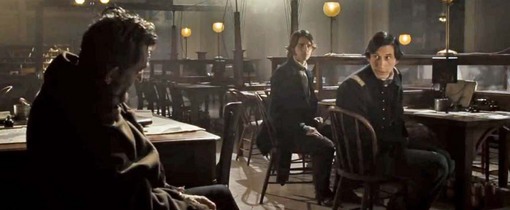
Lincoln: “It’s true because it works”
At the heart of Steven Spielberg’s “Lincoln” is a quiet scene between President Abraham Lincoln (Daniel Day-Lewis) and two young men, Samuel Beckwith (Adam Driver) and David Homer Bates (Drew Sease), in an otherwise empty telegraph cipher office. Lincoln has to make a crucial decision: Does he consider a peace proposal from a Confederate delegation on its way to Washington, and thus perhaps immediately end the bloody Civil War that has claimed the lives of more than half a million Americans, knowing that it would doom his attempt to pass the Thirteenth Amendment to the Constitution, officially banning slavery in the United States? Or does he try to legally solidify and extend his Emancipation Proclamation by getting the Thirteenth Amendment passed during a narrow window of opportunity (during the lame duck session of Congress between his re-election and second inauguration) at the cost of extending the war?

The private lives of Jodie Foster
(AP photo)
Near the end of her remarkable Golden Globes speech, a monologue overflowing with teasing language and sly pop-culture references, actor-director Jodie Foster mentioned a dog whistle. Although she sometimes seemed to be speaking extemporaneously, while also incorporating pre-crafted phrases designed to say exactly what she intended to say (and, equally important, what she had no intention of saying), I thought the message, addressed primarily to those who have pressured her to publicly acknowledge her lesbianism for so many years, was clear and unambiguous — except for the parts she deliberately wanted to leave ambiguous. And it’s pretty much the same message she’s been repeating since she was in college:
I value my privacy. Everything about being a performer makes it difficult to protect and maintain that privacy. I’ve been pressured to talk about my private life as a woman, formerly in a same-sex relationship with Cydney Bernard, who is raising two sons. And this is as much of a public “coming out” statement as you’re going to get from me.
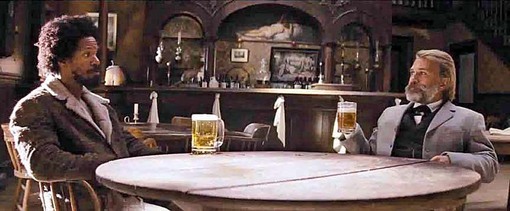
Django Unchain my heart (and set me free)
Quentin Tarantino has found his actor in Christoph Waltz — someone who can speak Tarantinian fluently and still make it his own. When Waltz uses a self-consciously ostentatious word like “ascertain” (as in, “I was simply trying to ascertain…” — the kind of verbiage QT is as likely to put in the mouth of a lowlife crook as a German dentist, or a Francophile plantation slavemaster, for that matter), it sounds right. As someone to whom Tarantino’s dialog often sounds cliche-ridden and cutesy, it’s a pleasure to hear Waltz saying the words in character rather than simply as a mouthpiece for the writer-director.
Oh, stop. This isn’t sounding the way I want it to.




